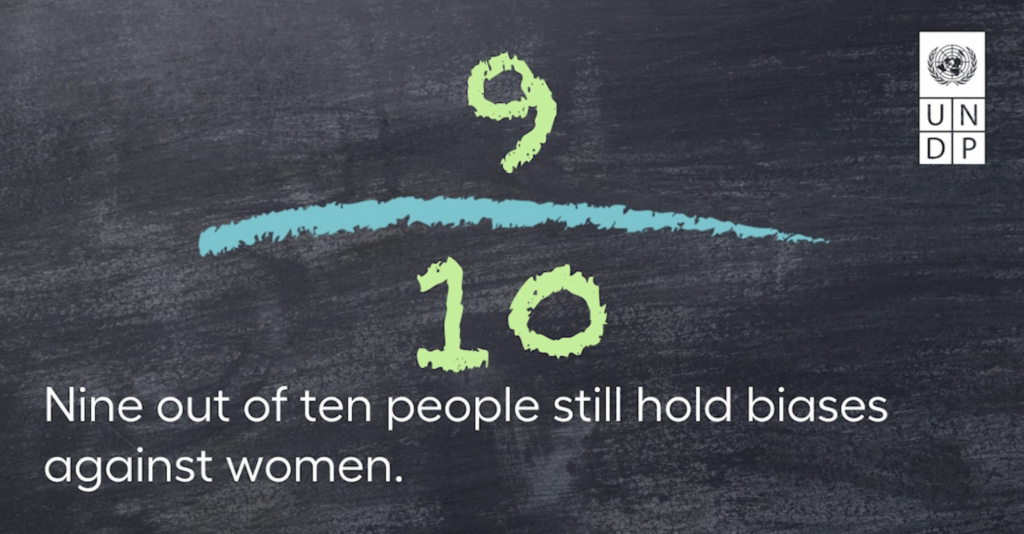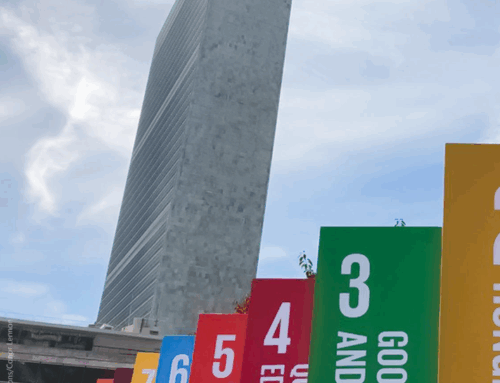A Decade of Stagnation: New UNDP data shows gender biases remain entrenched
12 de junio de 2023

A Decade of Stagnation: New UNDP data shows gender biases remain entrenched Lack of progress in the Gender Social Norms Index parallels human rights violations and is socially wasteful New York, 12 June 2023 – The latest Gender Social Norms Index (GSNI) report has revealed no improvement in biases against women in a decade, with almost 9 out of 10 men and women worldwide still holding such biases today. Half of people worldwide still believe men make better political leaders than women, and more than 40 percent believe men make better business executives than women. A staggering 25 percent of people believe it is justified for a man to beat his wife, according to the new GSNI report launched today by the United Nations Development Programme (UNDP), reflecting the latest data from the World Values Survey. The report argues that these biases drive hurdles faced by women, manifested in a dismantling of women’s
rights in many parts of the world with movements against gender equality gaining traction and, in some countries, a surge of human rights violations. Biases are also reflected in the severe underrepresentation of women in leadership. On average, the share of women as heads of state or heads of government has remained around 10 percent since 1995 and in the labour market women occupy less than a third of managerial positions. The report also sheds light on a broken link between women’s progress in education and economic empowerment. Women are more skilled and educated than ever before, yet even in the 59 countries where women are now more educated than men, the average gender income gap remains a staggering 39 percent in favour of men.
“Social norms that impair women’s rights are also detrimental to society more broadly, dampening the expansion of human development. In fact, lack of progress on gender social norms is unfolding against a human development crisis: the global Human Development Index (HDI) declined in 2020 for the first time on record—and again the following year. Everyone stands to gain from ensuring freedom and agency for women,” said Pedro Conceição, head of UNDP’s Human Development Report Office.
The report emphasizes that governments have a crucial role in shifting gender social norms. For instance, parental leave policies have changed perceptions around care work responsibilities, and labor market reforms led to a change in beliefs around the employment of women.
“An important place to start is recognizing the economic value of unpaid care work. This can be a very effective way of challenging gender norms around how care work is viewed. In countries with the highest levels of gender biases against women, it is estimated that women spend over six times as much time as men on unpaid care work,” said Raquel Lagunas, Director of UNDP’s Gender Team.
The report emphasizes that despite the continued prevalence of bias against women, the data shows change can happen. An increase in the share of people with no bias in any indicator was evident in 27 of the 38 countries surveyed. The report authors emphasize that to drive change towards greater gender equality, the focus needs to be on expanding human development through investment, insurance, and innovation. This includes investing in laws and policy measures that promote women’s equality in political participation, scaling up insurance mechanisms, such as strengthening social protection and care systems, and encouraging innovative interventions that could be particularly effective in challenging harmful social norms, patriarchal attitudes, and gender stereotypes. For example, combatting online hate speech and gender disinformation can help to shift pervasive gender norms towards greater acceptance and equality.
In addition, the report recommends directly addressing social norms through education to change people’s views, policies and legal changes that recognize the rights of women in all spheres of life, and more representation of women in decision-making and political processes.
Access the report at: https://hdr.undp.org/content/2023-gender-social-norms-index-gsni About the United Nations Development Programme (UNDP) UNDP is the leading United Nations organization fighting to end the injustice of poverty, inequality, and climate change. Working with our broad network of experts and partners in 170 countries and territories, we help nations to build integrated, lasting solutions for people and planet.
About the Gender Social Norms Index:
The Gender Social Norms Index captures how social beliefs can obstruct gender equality in multiple dimensions— political, educational, economic, and physical integrity. It is constructed based on responses to seven questions from the World Values Survey, which are used to create seven indicators using data from 80 countries and territories, covering 85% of the global population. This report presents an update of the GSNI since it was first calculated in 2019 (with data up to 2010-2014) and includes the most recent data for the period 2017-2022.
Contact Information:
Victor Garrido Delgado. victor.garrido.delgado@undp.org. +1 917 995 1687



